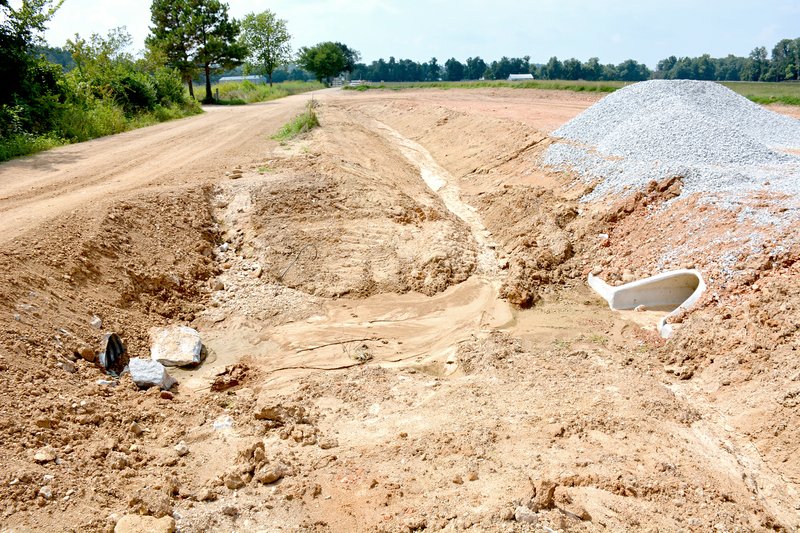Construction of the Fisher Ford bridge is a means of convenience for people who need to cross the Illinois River, but it is the cause of distress for two men.
Robert Munce owns 17 acres adjacent to the Fisher Ford bridge; two acres on the northeast side and 15 on the southeast side. When construction began on the bridge Munce was contacted, he said, by the county and asked to donate a portion of his land. He agreed.
The five-foot-wide portion of his land fell under what is called eminent domain. Eminent domain is defined as the power of government to use private property for public use, according to Cornell University Law School.
Munce donated the land, he said, under a condition that he was provided access to both of his properties. Weeks later, when Munce received the blueprints for the bridge, a check for $500 was enclosed.
On the northeast side of the bridge, Munce's original property access point all but disappeared. A new one was created at the inlet of the bridge, by way of an 8-foot-wide flat-bottom dirt ditch.
There are no plans to add concrete to the ditch, which concerned Munce.
"There's no way for me to get down there," he said during a telephone interview from his Florida home. "If I need to go down with my pickup and trailer I can't -- getting a tractor through there in the mud would also be a problem."
The southeast side of his property has a separate issue, which was brought forth by the person who leases the land, Bill Underwood.
Underwood owns Arkansas 59 Canoeing and Rafting.
Munce's land served as the river entry point for the old road that forded the river -- which story holds was a place someone could fish or ford, which got changed over the years to Fisher Ford.
For two decades, he has used Munce's riverfront land to provide access for people who want to float the river.
During construction of the road leading to the new bridge, an 18-foot-long ditch was dug across the easement, which effectively blocked access to the river.
The frustrated Munce said that he was not informed of a drainage ditch on the southside.
The plans, which were faxed to the Herald-Leader by Munce, show a point for a "special ditch" to run under the road on the southside; however, the font is tiny and barely legible.
Although the ditch is on the plans, it is unclear whether the extension onto the easement is within the construction limit. He also noted that the ditch channels water onto his private property.
"That property belongs to me -- look on the maps," he said. "They have accessed my property without consulting me and they have a conduit down there that they never spoke to me about.
"There's been no communication," said Munce, who has sought legal counsel from a local attorney.
Jeff Clark, who is the Benton County Road Department administrator of public services, on Tuesday said that he hadn't heard anything about the issue from Munce or Underwood; however, he knew about Underwood's issue because, when asked about road access issues at Fisher Ford, he said, "I haven't got in depth about it, it's not a concern to us."
Underwood said that on multiple occasions he spoke with Benton County Judge Bob Clinard about the issue, and each time -- Clinard rebuffed him. Clinard is Clark's boss.
In July, Clinard told Underwood he could install a whistle 24 inches in diameter -- as his own expense, Underwood said.
In early August, Clinard said he had not given Underwood permission to install the whistle.
"He asked me about it, I'm not going to deny it," Clinard said. "He's got to cross county property to get to private property and no one gave him permission to do it."
Told of what Clinard said, Underwood responded: "He gave me verbal permission and then turned it over to the county. The county came out and gave conditions where I couldn't put in more than 50 foot of pipe and I had to put end sections on it." He said he talked to Clark, but Clark denied he had ever spoken to Underwood.
Two weeks ago, Underwood, with Munce's permission, installed an 8-foot-long metal whistle (a circular drainage tube) and placed dirt over the top. An $800 out-of-pocket expense that restored the road access to the river bank.
"He had the right to put a pipe in, at his own discretion," Clark said Tuesday.
Munce was concerned that he had not been treated fairly when it came to his own property. "I don't know if I am being treated fairly or not," Munce said. "I do expect them to be cooperative and observe property rights."
"If we have, in fact, dug a ditch where we were not supposed to then we want to work it out and make it right," Clark said.
General News on 08/27/2014
